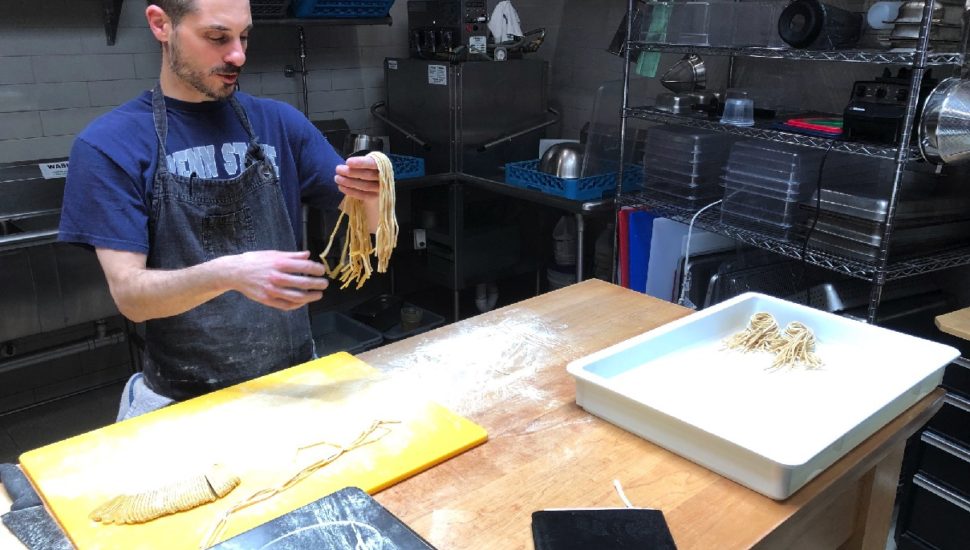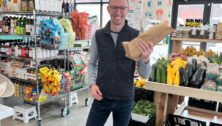Chester County Leadership: Tony Andiario, Chef and Co-owner of Andiario

Tony Andiario, chef and co-owner of West Chester-based Andiario, Chester County’s hottest new restaurant that he runs with his partner Maria Van Schaijik, spoke to VISTA Today last month about growing up in East Stroudsburg and then Wilkes-Barre, and how early experiences with his grandfather and then his father imbued a love for fresh ingredients and cooking in his young mind. A passion for soccer and the opportunity to play at the collegiate level led him to Penn State and what he hoped would be a career in graphic arts.
After graduation, Tony set those aspirations aside in favor of a career in the culinary arts, a passion he rediscovered while wandering the streets of Rome while his girlfriend attended classes in a semester-abroad program. He discussed moving to Phoenix, enrolling in culinary school, rising through the ranks of one of the city’s top restaurants, and making the decision to open his own restaurant in West Chester.
Where were you born and where did you grow up, Tony?
I was born the youngest of three kids in the Poconos around East Stroudsburg in 1978 and moved to Wilkes-Barre when I was four-years-old. There was an eleven-year gap between my older sister and me, so often it was just me and my parents. I remember going out to eat with them all the time. I always loved restaurants.
What did your parents do for a living?
My mother did odd jobs, including accounts payables for Nabisco, and helped my dad out with his real estate appraisal business.
What memories do you have of growing up in Wilkes-Barre?
Growing up in Wilkes-barre, we traveled back to the Poconos often. I still enjoy hiking and being outdoors.
I spent a lot of time with my grandparents, especially my grandfather who had a huge backyard garden. I would help him pick peas and tomatoes. To this day, the most nostalgic smell in the world to me is brushing up against a tomato plant. Reminds me of my grandfather and the time I spent gardening with him.
My dad worked from home a lot. At the time, there was a show on TV called Great Chefs of the World that my father and I liked to watch together when I got home from school. That’s when I first came to understand my connection to food.
How would you define your connection to food?
It’s multi-level. The most gratifying aspect of the connection for me is its link with agriculture. If I could give all this up and have a successful small farm I would!
Did you play any sports in high school?
I’m a soccer player! When I was three or four-years-old, I stood on the sidelines watching my older brothers play. I started playing when I was very young. When I was five, my parents lied about my age and got me on a team of seven-year-olds. From there, I played on through my second year of college. If I’d had the benefit of the training regimen and coaching kids today have, I might have gone a lot further.
What jobs did you have growing up?
My first job was at a Dairy Queen. A bunch of my close friends worked there, and they got me in. I did all the menial tasks, like taking out the trash and restocking the serving area, before graduating to working the window and taking care of customers. I also fished wires through the wall at the Nabisco plant where my mother worked.
What lessons did you take from those jobs that stay with you today?
At Dairy Queen I learned about how to manage the fast pace of business on a busy day.
What kind of music were you listening to in high school?
I grew up listening to my brother’s Rock & Roll music; groups like the Grateful Dead, Led Zepplin, and Bob Marley. I started listening to Marley when I was six or seven years old, got away from it a bit, and then came back to it as a teenager, when all my friends “discovered” Bob Marley.
Where did you go to college?
I went to the Wilkes-Barre-Scranton extension of Penn State for two years before transferring to Main Campus, where I finished up. I loved drawing and majored in graphic design. When I started, most graphic design was done by hand. But by the time I’d graduated, much of what used to be done by hand could be done faster by computer. Computers just weren’t my thing.
Why Penn State?
I didn’t have a lot of direction at the time and didn’t know what I wanted to do. Penn State was there; they had a soccer program, so I went.
Looking back, was Penn State a good choice for you?
I liked Penn State and wouldn’t trade the experience for anything. They delayed my entry into the restaurant business. But, when I finally decided what I wanted to do and got started at my first restaurant, the added maturity turned out to be an advantage.
How did you get into the restaurant business?
At Penn State, I cooked a lot. I lived with a bunch of guys who were into cooking. Whether it was a big pot of spicy chili or venison during hunting season, one of us was always cooking something.
When I graduated from Penn State in 2002, there weren’t any jobs in graphic design. I was living in Pittsburgh and quickly realized I would have to live in New York City if I expected a rewarding career in graphic arts.
The girl I was dating at the time had an open slot in a Semester Abroad program in Rome, which I decided to fill. I spent a lot of time wondering the streets and taking in the sights of Rome during the day while she was in class. That’s when I knew I wanted to be a chef.
I got back and enrolled in a culinary school in Arizona, where my brother lived. Before school started, I met a guy at the grocery store who told me being a chef and working in a restaurant is like professional sports. There are a lot of players and athletes in the culinary world, but very few make it to the top. His advice reminded me I had to get serious if I was going to make it as a chef.
By the time classes started, I had cooked so many meals and read so many books that I finally qualified as a good student. I was living in a one-bedroom apartment my brother cosigned for me, I didn’t have cable or television, my parents were sending me a few dollars every week, so I wasn’t flat broke and survived eating hardboiled egg sandwiches. When I came home at night, I read books and make pasta with my little pasta machine.
After a couple of weeks, one of my instructors, who saw that I had a bit more maturity, discipline and skill than the average student, helped me land a job at Michaels in the Citadel, which was then one of the top restaurants in Phoenix. The place had three chefs and fourteen cooks, so when I showed up at the back door ready to work, I was the low man on the totem pole; I was nothing. I didn’t care! I just kept my head down and worked hard.
After first telling me I was too old and too slow to work in his kitchen—that my career would better served if I took a job at Red Lobster. I rose through the ranks in that kitchen faster than any other cook.
Where does your persistence come from, Tony?
I think it’s more stubbornness than persistence, but it definitely comes from my grandfather. He was a stubborn person, as is my mother! My friends call it being focused. Whatever it is, I know I can be difficult to work for. Just like when I was playing soccer, when the restaurant is open, and the dinner rush is on its game time! If one of my staff makes a mistake, I’m going to tell him about it. Nothing personal.
So Why West Chester? How did you get from Arizona to West Chester?
Arizona was nice, but it was a long way away from my family. I knew for a long time I wanted to move back to Pennsylvania, and so did my partner, Maria, since her parents live here too. We looked around a bit before we settled on West Chester. Our perfect scenario was buying a small farm and then open a restaurant on the property. That proved to be too big of an undertaking.
Maria came back about 6 months before I did and scouted out locations. She looked at places in New Hope, Chestnut Hill and Phoenixville, among others. West Chester checked off a lot of our criteria. Maria knew the area, West Chester had the density we were looking for, the county courthouse, and a university as well—all big plusses. The fact that it’s a short, gorgeous drive to the country and our farm-based suppliers didn’t hurt either.
You’re a year in since Andiario’s opened. What opportunities are you focused on?
The new restaurant novelty has worn off at this point, so now it’s even more important that we build upon what we started: serving great food in an inviting atmosphere. We’re not wowing our guests with the number of dishes on our menu. Instead, we’re doing what we’ve always done; using the best ingredients, serving what we’re cooking to the best of our ability. That’s not going to change.
In the months and years ahead, we hope to continue to improve our relationships with our farmers/suppliers. When we first moved here, neither Maria nor I had jobs. No matter how far a trip, we visited every farmer who returned our email all in search of the perfect ingredients.
How do you know when you’ve found the right supplier?
It’s all about the product! Our suppliers are as passionate about their produce as we are about the food we serve. They care as much and work just as hard to get near-perfect ingredients to us, so we can get them to the table. When the lights go down, and guests start coming through the door for dinner, that adrenaline takes over, and we want to put on a good show. Our job is made so much easier and more enjoyable because our suppliers know how to grow a perfect head of lettuce.
What else are you focused on?
We see lots of room for improvement every day. We know there is so much more we could do to make Andiario better. For instance, our front of restaurant processes and systems could be smoother than they are. In the kitchen we’ve been short-staffed since the day we opened, so we need to get that resolved for sure. Running a kitchen like ours with two people is too grueling.
Has the success of Andiario’s surprised you?
In a town full of restaurants, I was surprised by how we’ve been consistently full pretty much every night. I didn’t expect that. We expected to be more of a special occasion restaurant, where guests would come three or four times a year. As it turns out, we have many regulars who come far more often than that. We’ve been really encouraged by the enthusiasm and support we’ve found here. We mean to keep earning it!
Finally, Tony, what is the best piece of advice you ever received?
I can’t answer that yet. It’s may very well be some advice I’m not following yet.
Connect With Your Community
Subscribe to stay informed!
"*" indicates required fields






























![95000-1023_ACJ_BannerAd[1]](https://vista.today/wp-content/uploads/2023/03/95000-1023_ACJ_BannerAd1.jpg)

















